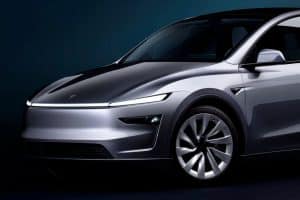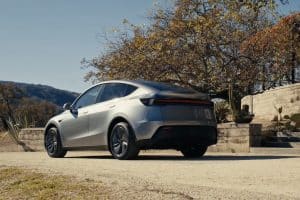Key Takeaways
- Tesla is considered best positioned among automakers to handle the Trump administration’s tariffs, according to Wedbush analyst Dan Ives.
- Dan Ives has set a price target of $315 per share for Tesla.
- In an interview with Yahoo Finance, Ives noted Tesla’s better positioning compared to the Detroit Big Three and foreign automakers, despite the impact of tariffs on Tesla due to imported parts.
- Ives identified the Chinese market’s reaction to the tariff war as a crucial factor for Tesla’s future performance.
- The next few quarters are seen as pivotal for Tesla, focusing on developments in Austin, autonomous technologies, and infrastructure buildout.
- Brand issues related to Elon Musk’s involvement with the Trump administration may potentially harm demand in Europe and the US.
- Ives suggests it is crucial for Musk to distance himself from political ties to prevent further brand damage.
In an age where global economics intertwine with local politics, few companies epitomize the turbulent dance of navigating tariffs and brand identity quite like Tesla. With the Trump administration’s tariffs looming as a worldwide economic disruptor, Tesla finds itself in a unique position to both weather these challenges and redefine its presence on the global stage. Here’s a deep dive into Tesla’s strategies, risks, and the road ahead as elucidated by Wedbush analyst Dan Ives.
Understanding Tesla’s Market Position
Wedbush analyst Dan Ives highlights that Tesla stands distinctively poised amongst automakers amid the Trump tariffs’ economic challenges. Unlike its peers, especially the Detroit Big Three, Tesla’s innovative strategies and market adaptability give it a competitive edge.
Key Insights from Ives
- Price Target: Ives places a bullish price target of $315 per share for Tesla. This underscores a confidence in Tesla’s capability to navigate through the economic turbulence created by tariffs, signifying investor trust and strategic resilience.
- Import Challenges: Despite facing hurdles due to parts imported from around the globe, Tesla’s strategic planning and supply chain adaptations allow it to remain less affected than its automotive counterparts.
The Role of the Chinese Market
One vital component for Tesla’s future growth trajectory lies in its interactions with the Chinese market. Ives underscores the importance of understanding and anticipating China’s response to tariff changes.
Crucial Factors
- Tariff Wars and Domestic Preferences: As China continues to navigate its economic policies in response to tariffs, there is a risk that increased tariffs and a tilt towards domestic purchasing could impact Tesla’s sales and market share in the region.
- Strategic Timing: The coming quarters are deemed pivotal, setting the stage for Tesla’s advancements in both technology and market positioning.
Development and Innovation: Tesla’s Ace in the Hole
Tesla’s ongoing developments in Austin and its strides in autonomous technology and infrastructure buildout represent critical aspects of its strategy to push past merely surviving the tariffs to dominating the future automotive landscape.
Focus Areas
- Technological Advancements: Investment in autonomous driving technologies and infrastructure positions Tesla ahead of the curve, potentially consolidating its market leadership.
- Expansion Plans: The buildout of facilities and resources in strategic locales like Austin serve to buffer against volatile global supply chain dynamics.
Elon Musk’s Political Quandary: Brand vs. Policy
Elon Musk’s alignment with the Trump administration represents a double-edged sword—while offering potential short-term policy advantages, it risks long-term brand perceptions, especially in diverse markets like Europe and the US.
Potential Brand Challenges
- Perception Risks: Political associations may deter a segment of Tesla’s consumer base in markets sensitive to socio-political stances.
- Strategic Distance: Ives stresses the importance of Musk taking a step back from controversial political affiliations to safeguard Tesla’s brand integrity.
Steering Through the Storm
Tesla’s scenario presents a textbook example of navigating corporate strategy amid geopolitical challenges. By leveraging its strengths in technology innovation, global market adaptability, and strategic foresight, Tesla portrays a robust blueprint for thriving in an uncertain economic environment.





